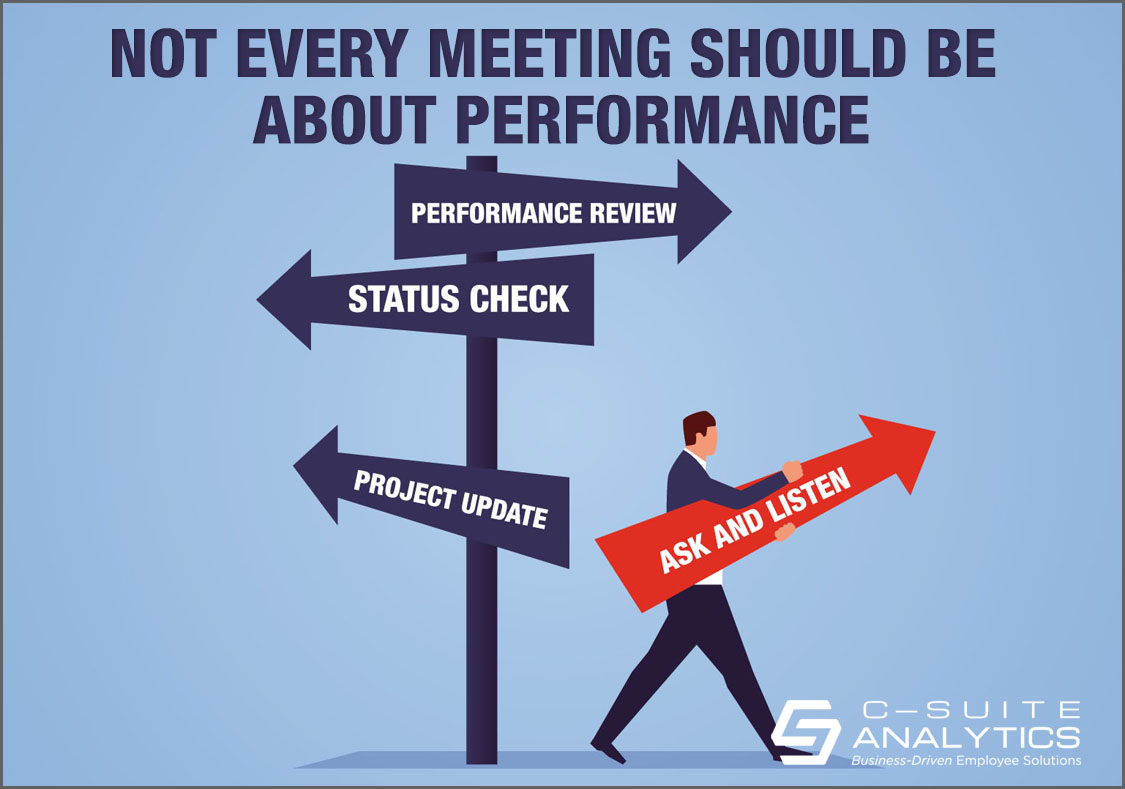AI, deportations, tariffs, and birthrate declines are reshaping America's workforce—blue- and white-collar alike. From baby boomer exits to AI disruptions, breaking down the workforce challenges no leader can afford to ignore.
Performance Meetings vs. Stay Interviews

If improving employee engagement and retention is at the top of your priority list, consider changing the idea that every Employee/Manager meeting should be about performance.
Most Meetings are Typically About Performance Not Engagement
Think about it. Almost every type of manager/employee meeting is a one-way street. We have many names for these meeting including project updates, status checks, performance reviews and specialized meetings for groups and teams. For example, in call centers they are called monitoring meetings where an employee sits with her manager each month to get scored and critiqued on a recent recorded customer call.
Some managers sprinkle niceties at the beginning or the end: “How are you doing?” “What’s happening?” “Everything going OK for you?” And companies that do performance reviews might also include some form of mandatory career questions at the end. “How do you think your role helps the company succeed?” “What do you like most about your role?” “Which job responsibilities do you enjoy most? Which do you least enjoy?”
Changing the Direction from Performance to Engagement
Recently, the bravest leaders have suggested that managers actually schedule these one-way meetings in the opposite direction where the employee talks about THEIR needs and managers listen. We know these meetings as Stay Interviews. Imagine the reaction of your employees if tomorrow each of their direct managers said:
“I want to schedule a meeting with you, just to talk about every way I can make working here better for you. How’s your calendar next Tuesday?”
Shift the Conversation for Engagement
Forgive your employees if they give a strange look, or if they enter the meeting with reports in hand to prove their worth. That’s how we’ve conditioned them.
After years of helping organizations implement Stay Interviews, we understand why Stay Interviews bring magic. Yet it’s easy to forget most employees’ initial, emotional reaction to being asked to participate in one. Their reaction is of course clouded by how much that employee trusts her manager…the always-present T-word…so it is either “Yes! I’d love to have that meeting”, or “Uh, sure, we can meet…let’s see.”
Solid data tells us these three facts:
1. Voluntary employee turnover is skyrocketing
2. Employee engagement has been stuck for 17 years
3. The number one reason why employees stay and engage…or disengage and then leave…is how much they trust their boss.
Why is Employee Engagement So Important?
Well-constructed research has pinpointed the dollar value of having an engaged team. Consider these examples and how they apply to the work you and your team do every day:
- Companies with high numbers of engaged employees have 48% fewer safety incidents, 41% fewer quality defects, 37% less absenteeism, and are overall 21% more profitable
- Employee turnover is lower, specifically by 65% in high-turnover organizations and 25% in low-turnover organizations
- Companies with engaged workforces have higher earnings per share as those with an average of 9.3 engaged employees for every actively disengaged employee have 147% higher EPS compared to their competitors
- Another study found a positive relationship between employee engagement and sales growth, lower cost of goods sold, customer focus, and reduced turnover
- And when salespeople give just 10% more effort, customers spend 23% more money
For more information on critical, bottom-line metrics and the impact employee engagement has on profitability, download my whitepaper on “How Much Does Employee Engagement Correlate With Profitability?“
More Engagement Means Better Retention
Can managers build trust by making every meeting about performance? Yes, some can. But the more impactful way to build trust in the manager/employee relationship is by including one-way meetings based on each employee’s individual needs.
The best method is to conduct a Stay Interview. A Stay Interview is a structured, one-on-one meeting between each leader and his employee to strengthen that employee’s engagement and retention.
Meet with your employees one-on-one and ask them what you can do to make work better for them. If they want more recognition or communication, they’ll tell you. Or if they want more training, specific coaching, or to work more with a peer who they find to be helpful. They’ll also tell you which reports they complete that no one reads, which equipment works better than others, and which colleagues disappoint them with shoddy work. Bring an open mind, too, because they have opinions of your management ways and might share them, good and bad.
Stay Interviews Build Trust Which Leads to Better Engagement
By asking, listening, probing, and taking notes, you can then work with them on the spot to identify actions to actually make their work better. In other words, you can move inside that box that matters, the one about bosses, colleagues, and duties. These are the parts of work that matter most to most of us, the ones employees talk about over dinner each night.
Don’t get me wrong. There are times and places for performance-based meetings. But to improve engagement and retention Stay Interviews work because they build trust.



